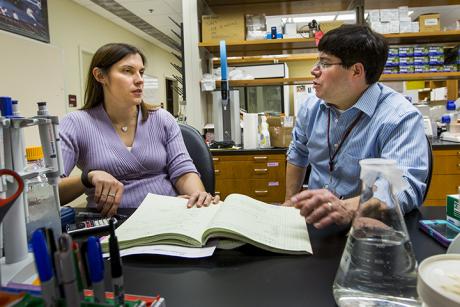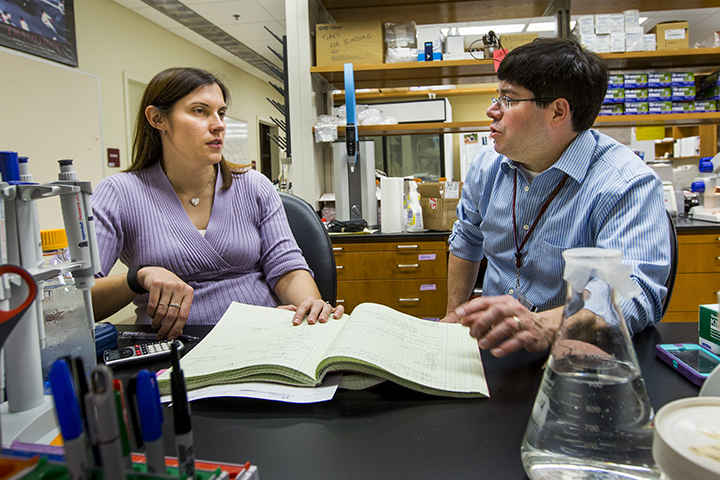New developmental neuroscientist is on a roll


For Gregg Stanwood, the good news keeps coming. During his transition from Vanderbilt University to the College of Medicine’s Biomedical Sciences Department, he received two honors — each propelling his work in developmental neuroscience one more step beyond his early days as a self-described “lab rat.”
As a member of two societies that study abnormalities in physiological development (the Teratology Society and the Neurobehavioral Teratology Society), Stanwood was nominated for a memorial award they established this year.
“The Patricia Rodier Mid-Career Award in Research and Mentoring is named after a pioneering neuro-toxicologist who blazed scientific trails and was a founding member and important leader of the organizations,” said Biomedical Sciences Chair Richard Nowakowski. “The fact that Gregg was selected reflects the importance of his scientific accomplishments.”
You don’t have to look hard for those accomplishments. Shortly after receiving the memorial award, Stanwood received the National Alliance for Research on Schizophrenia and Depression (NARSAD) Independent Investigator grant through the Brain and Behavior Research Foundation.
“The NARSAD is highly competitive, and the selection panel is comprised of the leaders in the field of mental illness and the brain,” said Nowakowski. “It provides Gregg with great flexibility to use the funds for his research in whichever way that he judges will provide the most impact. This is a rare privilege in science.”
The rare privilege includes a $100,000 grant, spread over two years, which will allow Stanwood to continue pushing neuroscientific boundaries.
“At Temple University, I was fortunate enough to work with a very senior experimental psychologist,” said Stanwood of his undergraduate days. “We were just understanding animal behavior. I wanted to understand what was going on in the brain that made that connection.”
Stanwood never stopped looking into this connection, which led him to pursue a doctorate in neuroscience and postdoctoral fellowships in neurochemistry and developmental neurobiology. In 2002, he was recruited by Vanderbilt and became an assistant professor of pharmacology in 2007. This year, Florida State hired him as an associate professor of biomedical sciences. While relocating from Nashville to Tallahassee, he wrote the NARSAD grant proposal.
“The target we’re going to study is the dopamine D2 receptor, which is a receptor that all antipsychotic drugs used in schizophrenia patients bind to,” said Stanwood. “Genetic mutations in these receptors also appear to contribute to increased likelihood of developing schizophrenia, but we do work on the underlying circuitry that is involved in multiple brain disorders.”
His focus is on building neurodevelopmental resilience to mental illness, similar to another College of Medicine researcher: “A key idea behind early detection of autism, similar to the program developed here by Amy Wetherby, is to figure out how to make those kids resilient to the symptoms of autism. We’re trying to expand that idea into the mental health domain. If we understand the mechanisms that alter neurodevelopmental trajectory before diagnosable symptoms even present, then we have an opportunity to ameliorate mental health disorders on the front end.”
When he’s not pursuing neuroscientific discovery, or being a dad, Stanwood enjoys volunteering. He is interested in getting involved with the Tallahassee community, especially with parents of children with developmental disabilities. His wife, Beth Ann McLaughlin, is a neuroscientist at Vanderbilt, and his children are 14 and 12. Currently his family resides in Nashville, but they’re “committed to making a long-distance family work.”

